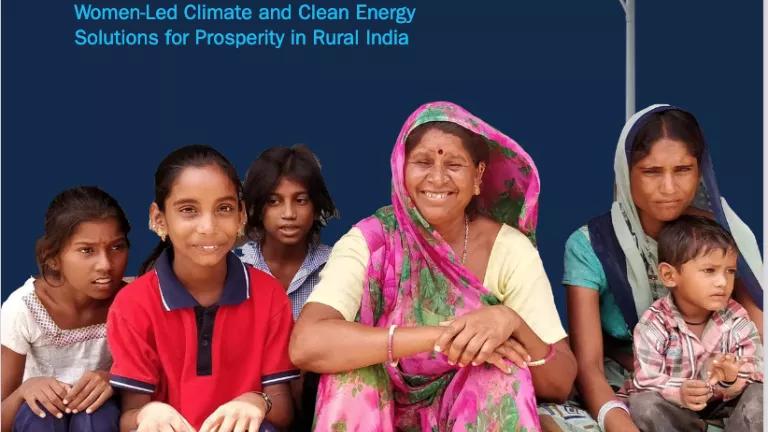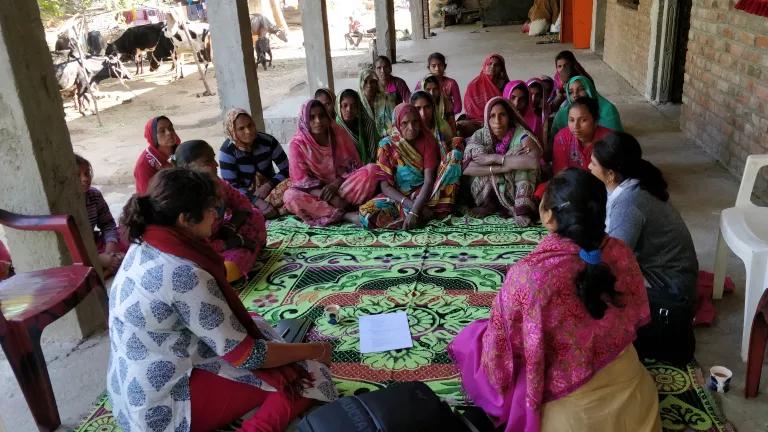India Focus: Less Talk, More Action on Climate Change
Read about India's new climate target and more at COP26.

India Prime Minister Narendra Modi (center) greeting British Prime Minister Boris Johnson and UN Secretary-General Antonio Guterres as he arrives for day two of COP26 on November 1, 2021.
As countries gather in Glasgow this week, leaders from developing countries echoed the message today: less talk and more action is needed to combat the climate crisis. India stepped forward with stronger action—committing to meet half of its energy needs with renewable energy by 2030. This is huge.
President Joe Biden apologized for the U.S. withdrawal from the Paris Agreement and rolled out a broad package of U.S. climate action in Glasgow. Yet, developing countries, including India’s Prime Minister Narendra Modi, emphasized that to decarbonize and build a clean energy future more finance by developed nations is needed to the tune of $1 trillion.
NRDC President Manish Bapna’s Statement
“India is making a vital contribution in the global march against climate change—which disproportionately harms the world’s vulnerable people the most. Its bold pledges to cut climate pollution by a billion tons, in large part by meeting 50 percent of its energy requirements with renewable energy by 2030, signals India’s resolute commitment to a healthier and clean future, for the people of India and the world.
“The world’s fifth-largest economy and fourth-largest carbon emitter has set a high bar for stronger climate commitments by key countries at COP26.”
India’s New Climate Target at Glasgow
By definitively committing to 50% of India’s electricity generation from non-coal or gas sources by 2030 is nothing short of transformative. India is a leader in clean energy, especially solar and wind energy. India is on largely on track to meet its Paris Agreement targets, as discussed in recent analysis by NRDC and partners. Prime Minister Modi is sending a clear signal to business, industry and world leaders that India is moving forward with decarbonization and building a clean energy economy.
India also strengthened its Paris target by committing to: further reduce the carbon intensity of its economy to less than 45%, from the earlier target of 33 to 35 percent, from 2005 levels by 2030; increase non-fossil energy capacity to 500 GW by 2030, formalizing India’s earlier renewables commitment; and reduce India’s total projected carbon emissions by one billion tons from now to 2030. India also joined other nations in announcing a net zero emissions target by 2070.
India’s energy demand and emissions in a business as usual scenario are projected to double if not triple by 2050, despite the current COVID-19 economic downturn. While per capita emissions are low at present, India is already the third largest single-country emitter of greenhouse gases and has the second largest population in the world at over 1.3 billion. India’s cities are rapidly urbanizing and bearing the brunt of the climate crisis, making sustainable cities and employment with healthy communities a central priority.
India is a linchpin in international negotiations. India is effectively the lead representative among developing countries. Achieving meaningful cooperation can go a long way to moving toward a common approach to climate change, while respecting the pressures of global inequality. If climate solutions can work in India, they are likely to work in other developing countries.

NRDC's Charu Lata and Jake Schmidt in front of an electric racing car at COP26.
Partnership
Prime Minister Modi also highlighted the importance of partnership in solving the climate crisis. He emphasized how “we must all walk together”. World leaders, local governments, business leaders, financial institutions, scientists, academics, nonprofits and more must work together on climate solutions. Only through partnership can the world build a global economy powered by clean energy while protecting the most vulnerable from the devastating impacts of climate change.
Partnership was the central theme in the State Department’s recent series on Diaspora Diplomacy in Climate Change. The virtual session highlighted NRDC’s partnership with the Administrative Staff College of India in advancing electric mobility and decarbonized buildings in Telangana and other Indian states. The Diaspora Diplomacy session shows how working together and exchanging ideas is effective in implementing climate solutions. Future discussions and partnerships, like Diaspora Diplomacy, are critical to keeping global warming below the 1.5ºC (2.7ºF) degree threshold.
Delaying climate action is no longer an option for the world. As countries around the world emerge from COVID-19 and ramp up investment to boost economies, investing in green recovery and committing to greater climate ambition can help create jobs, protect communities, and fight climate change.



